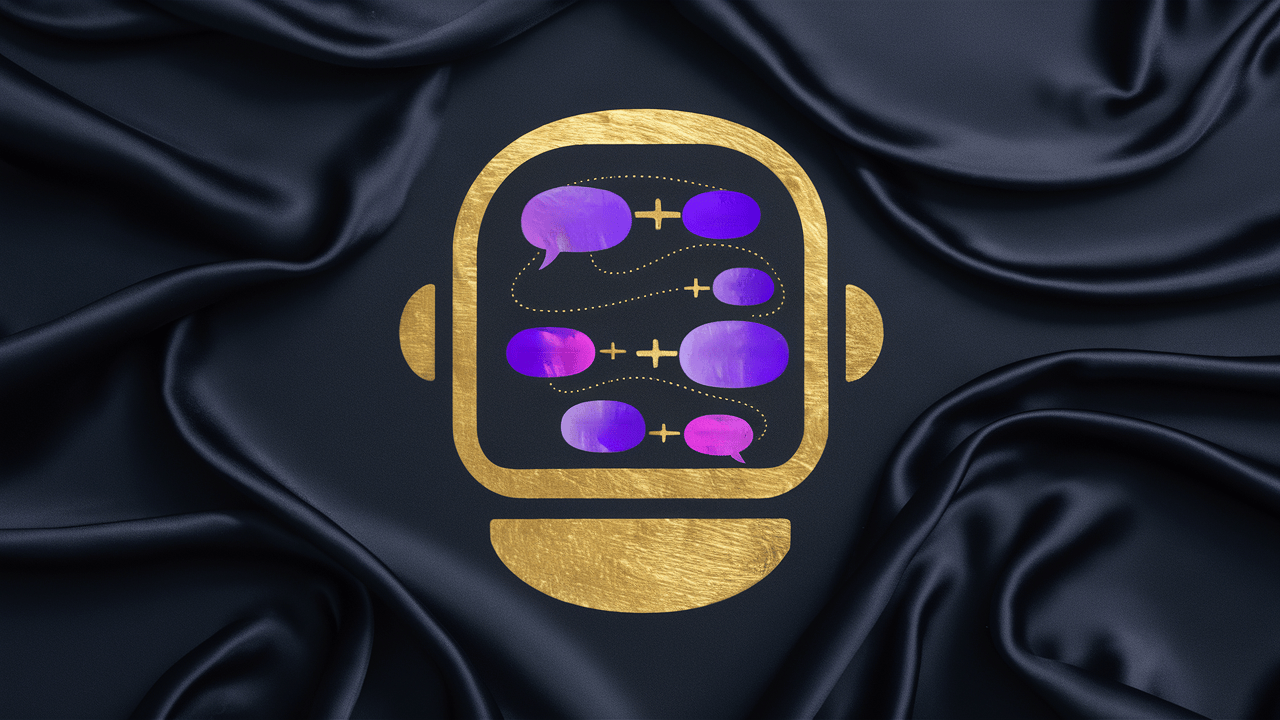While Custom GPTs were groundbreaking in their own right (the true OG), Claude Projects has leapfrogged them in functionality and power. Anthropic’s rapid innovation has allowed Claude to become the superior tool for serious business applications. If you’re still relying on custom GPTs, you’re missing out on more advanced capabilities, unless your use case is just very simple AI tasks.
The Main Difference — In a NutshellGPTs function more like specialized mini-apps or extensions within ChatGPT that OpenAI will likely monetize later (though they fumbled the initial rollout with easily fixable discoverability issues—something glaringly obvious to me, given my years of SEO experience). Upon release, I instantly knew the “AI app store” hype would die down, and the GPT store could stumble due to these simple oversights. GPTs are good for quick, niche tasks but hit a wall fast when you need serious adaptability or context-driven insights.
Claude Projects, on the other hand, aren’t just a step up—they’re rewriting the rulebook. With a massive context window, deep customization, and robust collaboration features, it leaves GPTs on the sidelines of my daily toolkit. If you’re serious about leveraging AI strategically, Claude Projects are your ticket to the big leagues. They handle complex, large-scale tasks that make GPTs feel like mere “browser extensions” or modular tools (though they can still be handy in certain contexts).
Claude can act as your operations manager, strategic advisor, and R&D powerhouse all rolled into one. It can analyze market trends, optimize your supply chain, draft comprehensive business plans, and even help with product development—all without the cold start problem, and while maintaining understanding (context) across your entire business ecosystem. It’s not just a tool; it’s a versatile AI partner that can adapt to virtually any business function you throw at it. That’s the big difference we are talking about here.
Claude Projects vs. Custom GPTs: Feature Showdown
Feature
Claude Projects
Custom GPTs
Developed by
Anthropic
OpenAI
Context Window
200,000 tokens (~150,000 words)
8,000-32,000 tokens
Customization
Extensive, adaptable custom instructions
Limited to 8,000 characters
Knowledge Integration
Superior document and data integration
Basic document upload feature
Team Collaboration
Robust shared projects and team features
Basic collaboration, better external sharing
Artifact Creation
Interactive code, documents, charts
Not available
API Pricing (Input)
$3 per 1M tokens (Claude 3.5 Sonnet)
$10 per 1M tokens (GPT-4o)
Web Interface Pricing
$30/user/month (Team plan), Min 5 accounts
$25/user/month (Teams)
Unique Features
Artifacts, deeper project management
Image generation, web access, voice mode
Setup Process
More involved, more learning curve
User-friendly, AI-guided setup
Best For
Document-heavy, complex business tasks
Quick, specialized tasks and sharing
Web Access
No
Yes
Future Potential
Continuous improvement in core capabilities
GPT Store for specialized AI assistants
Note: This comparison focuses on Claude Projects and Custom GPTs, which are specific implementations of Claude and ChatGPT models. Features and pricing may vary for different versions or usage scenarios.
User Interface and ExperienceWhen it comes to interacting with these AI tools, there’s a noticeable difference:
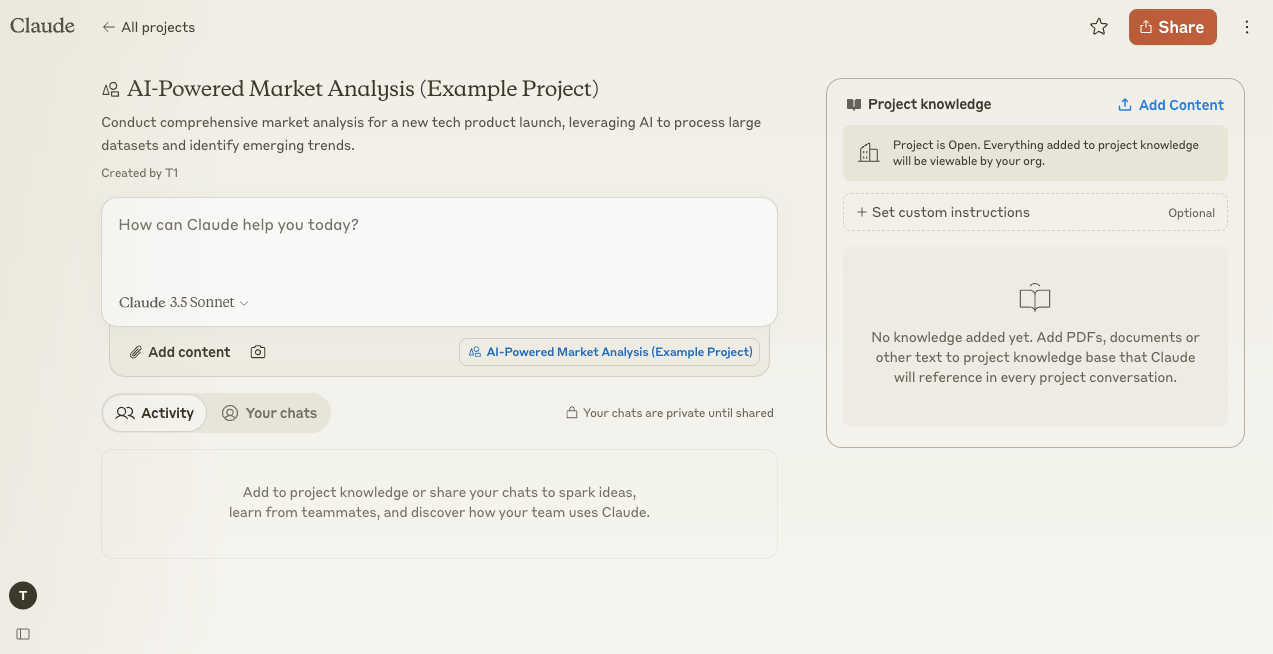 – Custom GPTs: These are more like specialized kiosks. They’re focused on specific tasks, with an interface that’s straightforward but can feel limiting when you’re aiming for something more complex.
– Custom GPTs: These are more like specialized kiosks. They’re focused on specific tasks, with an interface that’s straightforward but can feel limiting when you’re aiming for something more complex.
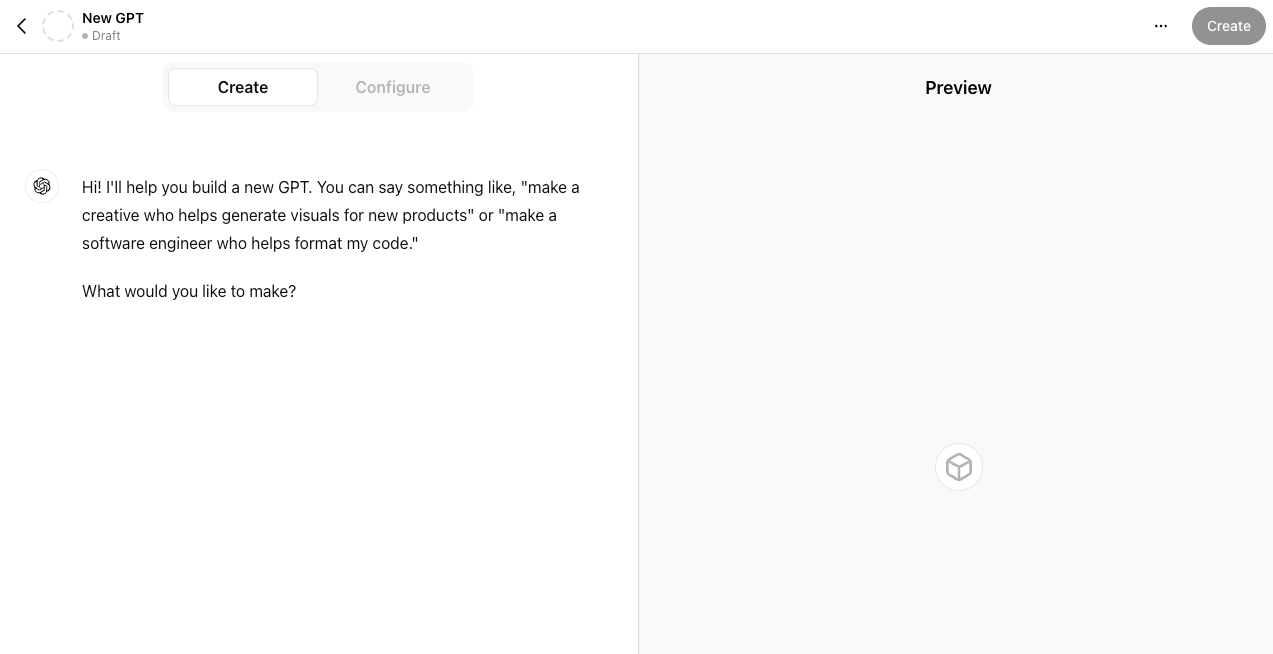 Creation and Setup ProcessThe way you get started with each tool is also distinct:
Creation and Setup ProcessThe way you get started with each tool is also distinct:
Core Capabilities1. Depth of Customization- Claude Projects: You’re creating an AI that essentially becomes an extension of your brain. Fine-tuning isn’t just an option; it’s the main event. You can train it to fit your specific needs, making it feel like a dedicated AI team member.
Edge: Claude Projects
2. Context Handling- Claude Projects: With a massive 200,000-token capacity (about 150,000 words or 500 pages of text), it’s like having a PhD-level assistant with photographic memory. Long conversations, in-depth research, and complex strategy? It’s all in a day’s work. For most people, this is probably the most significant feature that sets Claude Projects apart. It allows users to upload and process large business documents or extensive datasets in a single interaction.
Edge: Claude Projects by a landslide
3. Knowledge Integration- Claude Projects: Upload everything that matters—documents, code, data—and watch as Claude integrates that knowledge into its responses in powerful ways. This allows Claude to become an expert in your specific domain. Claude 3.5 Sonnet outsmarts GPT-4o in general usage, excelling in brainstorming, ideation, graduate-level reasoning, code generation, and math tasks.
Edge: Claude Projects
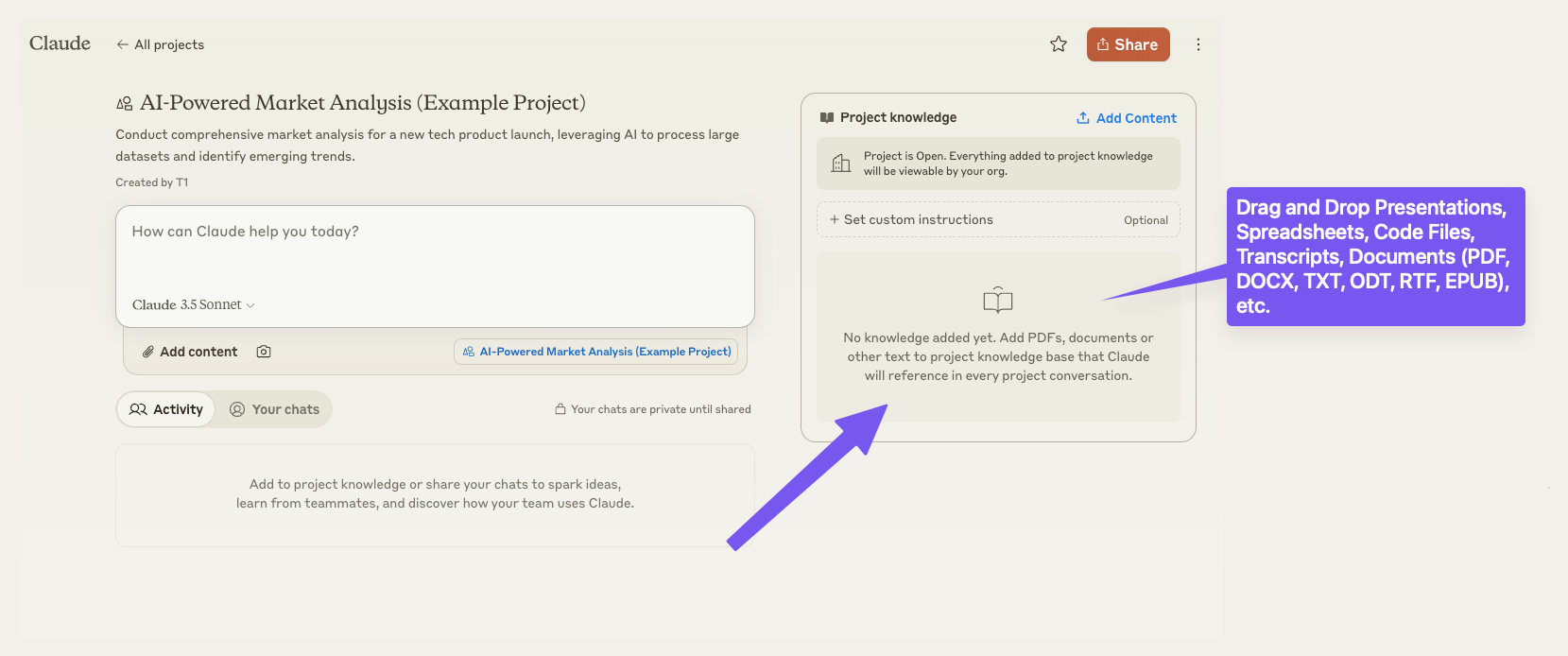 4. Custom Instructions: Flexibility and Limits- Claude Projects: Like that friend who never forgets anything – it’s got a massive 200,000 token memory (think 500 pages of text). But this also extends to custom instructions! I have never hit a cap on custom instructions, so you can throw in complex operational guidelines, tons of documentation, even entire workflows without breaking a sweat. It’s got the space and flexibility to handle whatever crazy detailed instructions you throw at it.
4. Custom Instructions: Flexibility and Limits- Claude Projects: Like that friend who never forgets anything – it’s got a massive 200,000 token memory (think 500 pages of text). But this also extends to custom instructions! I have never hit a cap on custom instructions, so you can throw in complex operational guidelines, tons of documentation, even entire workflows without breaking a sweat. It’s got the space and flexibility to handle whatever crazy detailed instructions you throw at it.
Edge: Claude Projects by a landslide
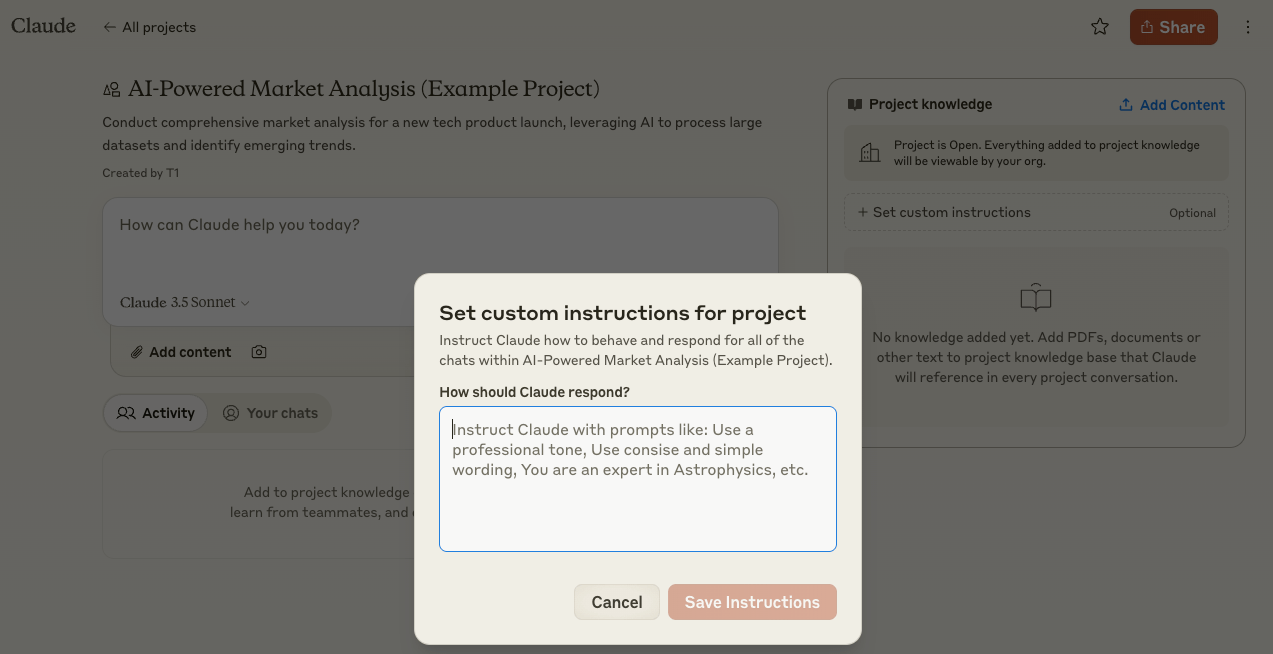 Performance and Usability5. Complex Prompt Handling- Claude Projects: Claude 3.5 Sonnet accurately interprets and executes detailed commands, making it perfect for tasks involving intricate workflows or multi-step processes—more effectively compared to GPT-4.
Performance and Usability5. Complex Prompt Handling- Claude Projects: Claude 3.5 Sonnet accurately interprets and executes detailed commands, making it perfect for tasks involving intricate workflows or multi-step processes—more effectively compared to GPT-4.
Edge: Claude Projects
6. Processing Speed- Claude Projects: Claude 3.5 Sonnet is slightly faster than GPT-4o in terms of response time and feels quicker overall in terms of latency during interactions.
Edge: Slight advantage to Claude Projects, due to underlying base models.
7. Accuracy- Claude Projects: In domain-specific tasks, especially when relevant knowledge is uploaded, Claude Projects consistently outperforms custom GPTs, offering more reliable and context-aware responses.
Edge: Claude Projects
Collaboration and Information Management8. Team Collaboration- Claude Projects: Designed for teamwork, with shared projects and collaborative functionality that make group projects a breeze. It’s designed to be a central hub for team intelligence and productivity. You can have multiple chats within a single project, each acting like a specialist with access to the same background information. Team plans are available at $30/user/month and include the Projects feature for collaboration.
Edge: Claude Projects for internal collaboration, Custom GPTs for external sharing
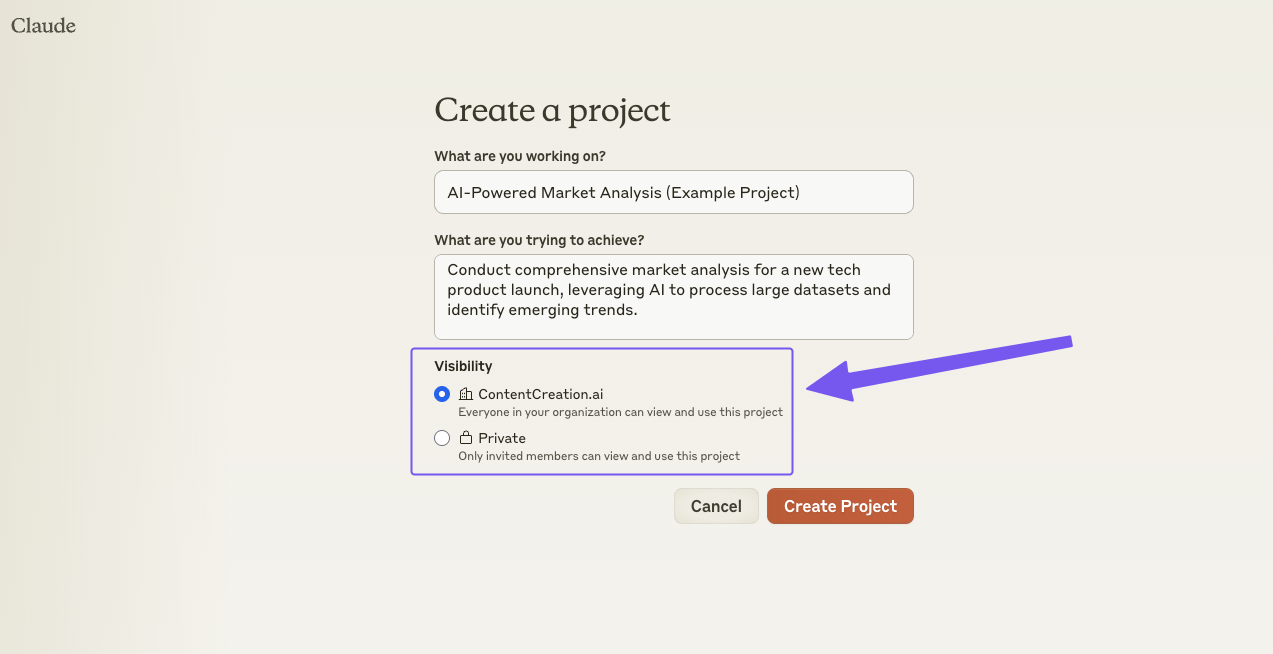
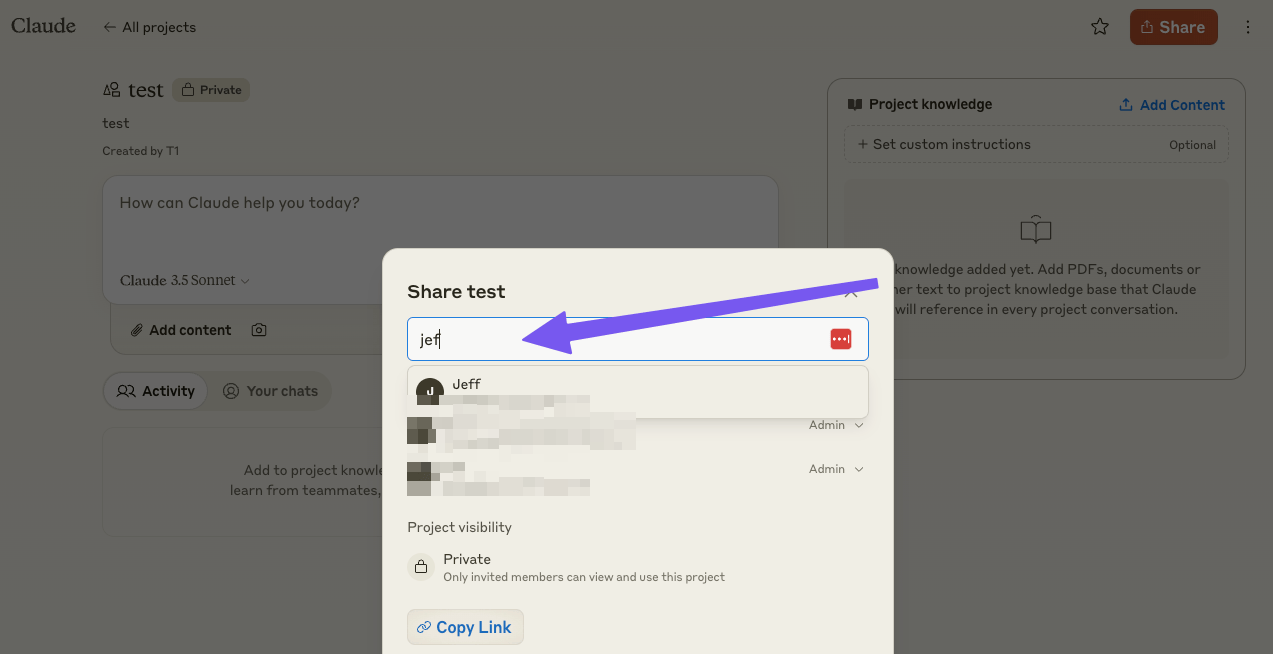 9. Information Architecture & Retrieval- Claude Projects: Like a well-organized filing cabinet. You can create folders, subfolders, and add various files to keep everything organized to your liking. This setup makes it easy to sort, retrieve, and update information.
9. Information Architecture & Retrieval- Claude Projects: Like a well-organized filing cabinet. You can create folders, subfolders, and add various files to keep everything organized to your liking. This setup makes it easy to sort, retrieve, and update information.
Edge: Claude Projects
Practical Considerations10. Content Creation- Claude Projects: Generate artifacts—code, content, business documents, etc.—right within your project, seamlessly integrated into your workflow. The new Artifacts feature allows for real-time code preview, which is particularly useful for beginners.
Edge: Claude Projects for text-based content (user experience & smarter), GPT-4o for image generation and auxiliary features
11. Integration Ease- Claude Projects: Provides a more seamless integration with existing workflows simply due to its organized file structure and superior document management. The ability to easily update and maintain a knowledge base within projects gives it an edge for ongoing, complex work. (Though it’s not perfect, it’s better than GPTs)
Edge: Claude Projects for long-term, complex projects that require ongoing updates and deep integration. Custom GPTs for quick setup of specialized, static tools.
12. Cost-Effectiveness- Web Interface: OpenAI Teams ($25/user/month) vs Claude ($30/user/month)
Edge: GPT-4o for web interface, Claude Projects for API use
For developers and businesses looking to integrate these AI tools into their systems, the API pricing can make a significant difference. Claude Projects’ lower API costs could lead to substantial savings for high-volume users, potentially offsetting the higher web interface cost.
13. Additional Features- Claude Projects: The standout feature is the artifacts feature, which is a major productivity booster and a fantastic addition to the user experience. I absolutely LOVE the artifacts feature. I’m usually pretty good at dreaming up features I want, but I never anticipated or even thought of something like this. It’s a really an amazing addition, that sets Claude Projects apart from all other AI tools. Once you start using artifacts, it’s like going from manual to automatic windows, or discovering high refresh rates on your phone screen – you simply can’t go back. It’s that good.
Edge: GPT-4o for variety of auxiliary features
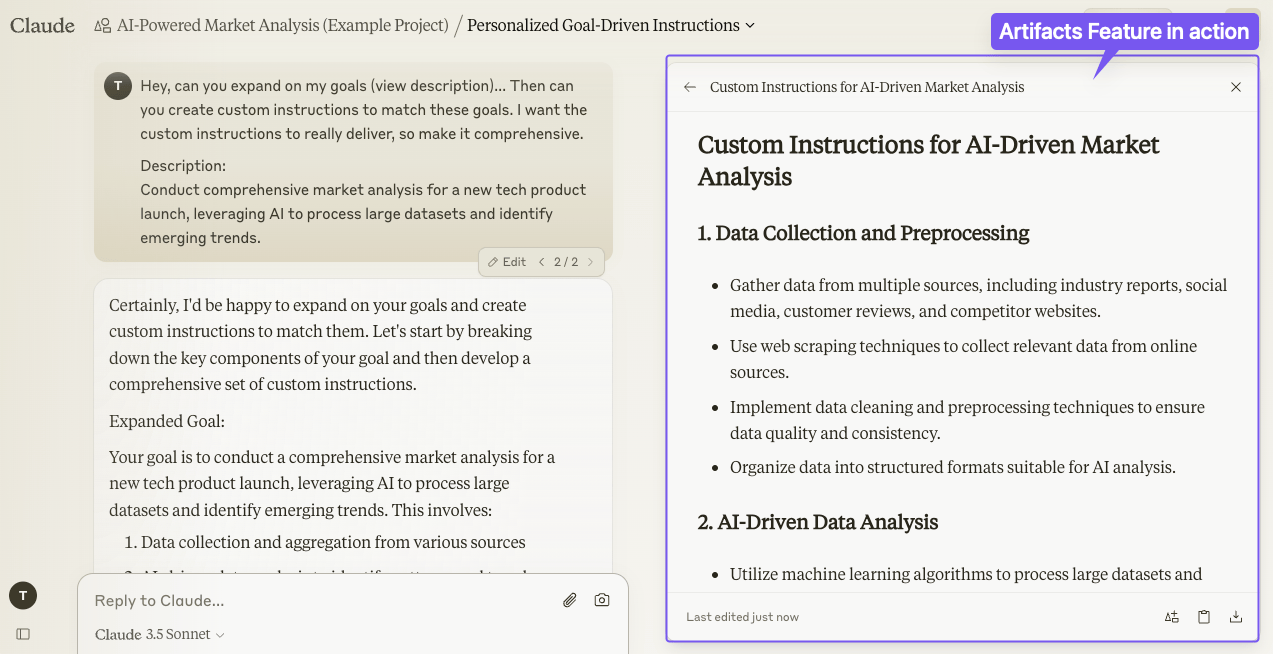 Artifacts in aComparative Analysis: The underlying modelsWhen comparing the underlying models, Claude 3.5 Sonnet and GPT-4o are both highly capable, with Claude often having a slight edge in advanced tasks. However, the real breakthrough—the ‘aha moment’—lies in the implementation: Claude Projects significantly outperforms custom GPTs in complex or document-heavy use cases for business, or even personal use.
Artifacts in aComparative Analysis: The underlying modelsWhen comparing the underlying models, Claude 3.5 Sonnet and GPT-4o are both highly capable, with Claude often having a slight edge in advanced tasks. However, the real breakthrough—the ‘aha moment’—lies in the implementation: Claude Projects significantly outperforms custom GPTs in complex or document-heavy use cases for business, or even personal use.
Its superior context handling and integration capabilities make it the go-to choice for those pushing the boundaries of AI in a business context. That said, GPT-4o and custom GPTs still have their place, particularly for simpler tasks or specific features like image generation. Ultimately, the choice between these powerful tools depends on your specific needs, the complexity of your projects, and the depth of integration you require.
It’s worth noting that while both models perform well on standardized tests, these benchmarks may not always reflect real-world performance accurately.
What About Image Generation and File Export Capabilities?Image Generation Ability- Claude Projects: Cannot generate photorealistic images or graphics. While it can generate simple SVG code and diagrams, it lacks the ability to create complex images like those produced by DALL-E. The closest it gets to image creation is generating scalable vector graphics (SVGs) for basic shapes, icons, and diagrams.
Export Ability ComparisonHere I offer a summary of what file types each platform can create and export, highlighting the specific formats that can be downloaded directly versus those that require manual copying (a matter of efficiency).
Claude Projects Export Capabilities:
Claude Projects allow the export of several artifact file types, while others need to be copied and pasted into a separate editor. Here’s the breakdown:
File Type
Direct Download
Copy-Paste Required
Code Files (.py, .js)
Yes
No
Markdown (.md)
Yes
No
HTML (.html)
Yes
No
SVG (.svg)
Yes
No
Mermaid Diagrams
No (rendered in-place)
Yes
React Components
No (rendered in-place)
Yes
CSV, JSON, XML, YAML
No
Yes (manual formatting)
LaTeX (.tex)
No
Yes (manual formatting)
Custom GPTs Export Capabilities (via GPT-4o):
GPT-4o offers a wider range of direct download options:
File Type
Direct Download
Copy-Paste Required
CSV Files (.csv)
Yes
No
JSON Files (.json)
Yes
No
XML Files (.xml)
Yes
No
YAML Files (.yaml)
Yes
No
LaTeX Files (.tex)
Yes
No
Plain Text (.txt)
Yes
No
Markdown (.md)
Yes
No
HTML (.html)
Yes
No
SVG Files (.svg)
Yes
No
Mermaid Diagrams
No
Yes (for code)
React Components
No
Yes (for JSX code)
Code Files (.py, .js)
No
Yes
Additional Insights and Clarifications- Claude’s Artifact Feature: While Claude can generate various types of files like Markdown, HTML, and SVG as downloadable artifacts, it cannot directly export binary file formats like Excel (.xlsx), PDF, or images (PNG/JPEG). For formats like CSV, JSON, and LaTeX, Claude can format them within a conversation, but you’d need to copy the content manually.
Biggest Downside to Claude ProjectsThe one downside to Claude projects is a byproduct of its biggest advantage (large context means more cost, or in this case message caps). However, this can be a significant downside, depending on your usage. If you have numerous documents uploaded to a Project, chatting with that specific Claude project can rapidly deplete your chat allotment for that user account.
You might find yourself conversing for a relatively short time, only to be suddenly notified that you have just 10 chats remaining until 1 PM (even though it’s only maybe just past 10AM — thats 2 or 3 hours of downtime—or whatever the current limits are, they seem to vary.) This is the most frustrating aspect.
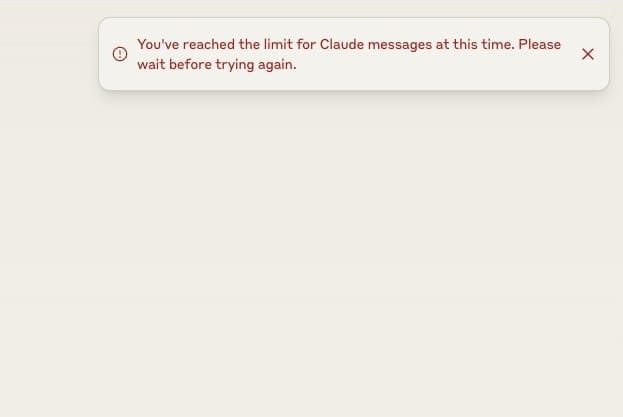 The reason is that during each chat, Claude may read through all those documents, consuming more tokens and thus quickly exhausting your chat allotment. This is only the case if you have a lot of documents uploaded. You can chat for significantly longer if you just use the regular Claude chats (non-project chats).
The reason is that during each chat, Claude may read through all those documents, consuming more tokens and thus quickly exhausting your chat allotment. This is only the case if you have a lot of documents uploaded. You can chat for significantly longer if you just use the regular Claude chats (non-project chats).
It would be nice if you could pay 50-60/mo per account, and have double or more chat allotment.
The reason is that during each chat, Claude may read through all those documents, consuming more tokens and thus quickly exhausting your chat allotment. This is only the case if you have a lot of documents uploaded. You can chat for significantly longer if you just use the regular Claude chats (non-project chats).
It would be nice if you could pay 50-60/mo per account, and have double or more chat allotment.
Biggest Upside to Custom GPTsLet’s talk about a killer feature that Custom GPTs have over Claude Projects: share-ability. Sometimes you want to hook up a friend, client, or colleague with a tailor-made AI assistant, and Custom GPTs let you do just that. With Claude Projects, you’re locked into your organization—no sharing outside the walls. But Custom GPTs? They’re like your own personal AI food truck—serve ’em up to anyone, anywhere.
OpenAI finally got with the program and opened up Custom GPTs to free users. Smart move (something I always thought was a necessity from the get to, in order to build a network effect). It’s like they’re planting seeds for a massive AI ecosystem. If they can iron out the kinks in their GPT store (and there are plenty), we might be looking at the App Store of AI. The potential is insane, but right now, it’s like a Ferrari with a busted engine—looks great, but it ain’t running at full throttle.
Here’s a real-world example: I just quickly whipped up a custom AI business mentor for a friend diving into the med spa game. This isn’t your grandma’s chatbot, or a typical crappy GPT—it’s a hyper-specialized brain that can spit out marketing gold and business wisdom tailored to her niche. Way more useful than vanilla ChatGPT or even a standard Claude chat. And the best part? I could send her a link, and boom—instant access to AI brilliance, no tech wizardry required on her end.
 Now, if my friend wants to get serious, she could take those custom instructions and supercharge them with Claude Projects. Upload her strategy docs, business plans, the works—and watch Claude transform into a med spa mogul’s dream assistant. That’s when Claude Projects starts leaving Custom GPTs in the dust.
Now, if my friend wants to get serious, she could take those custom instructions and supercharge them with Claude Projects. Upload her strategy docs, business plans, the works—and watch Claude transform into a med spa mogul’s dream assistant. That’s when Claude Projects starts leaving Custom GPTs in the dust.
So, while Custom GPTs are great for sharing and getting your feet wet, Claude Projects is where the real magic happens once you’re ready to go all-in with your data. It’s like comparing a Swiss Army knife to a fully-equipped workshop—both useful, but on completely different levels.
Future PotentialLooking ahead, both platforms have some exciting developments on the horizon:
Custom GPTsThe GPT Store could become a game-changer in how we discover and use AI tools—or it can just as easily flop in the long run. It does have some real potential to become an “App Store of AI”—an ecosystem, and marketplace of specialized AI assistants. However, the initial rollout has been rocky, and OpenAI needs to iron out some kinks to realize this potential. Maybe they will release more advanced GPTs with autonomous agent capability 🤔 — now that would be a game-changer, with potential to disrupt countless SAAS companies in the process (likely where their vision is currently).
Claude ProjectsWhile Anthropic hasn’t made any official announcements, the rapid pace of their development suggests we can expect continued improvements. Potential upgrades could include:
Both platforms are evolving quickly, and it’ll be interesting to see how they address their current limitations and expand their capabilities in the coming months and years.
Key TakeawaysBefore we wrap up, let’s distill the essence of our Claude Projects vs Custom GPTs showdown:
Remember, the “best” choice depends on your specific needs, project complexity, and how deeply you need to integrate AI into your workflows. Whether you’re looking for a Swiss Army knife or a full-fledged AI workshop, there’s a tool that’s right for you.
Final ThoughtsLet’s break it down: choosing between Claude Projects and custom GPTs really comes down to what you’re trying to achieve and how complex your needs are.
Claude Projects is your heavy-hitter. If you need an AI assistant that’s going to dig deep into a ton of business strategy, financial, marketing documents and more, while keeping your whole team on the same page, this is your go-to. It’s built for the long haul—handling those intricate project and business workflows that benefit from truly aware AI assistants, overcoming the “cold start” problem.
On the flip side, Custom GPTs are more like your Swiss Army knife of AI tools. They’re perfect for those quick, specialized tasks where you need a targeted solution fast. Plus, you can share them externally, which can be super convenient (Clients, Friends, etc). But here’s the thing: they start to sweat when you use it for complex, evolving projects, which need the higher context and ability to update business documents.
So, if you’re serious about using AI to really drive your business forward, Claude Projects is where it’s at. It’s got the brains, the flexibility, and the team-friendly features to make a real impact on your business. But if you’re just looking for some quick wins or need to tackle specific, isolated tasks (or don’t want to change tools), custom GPTs can still pack a punch.
